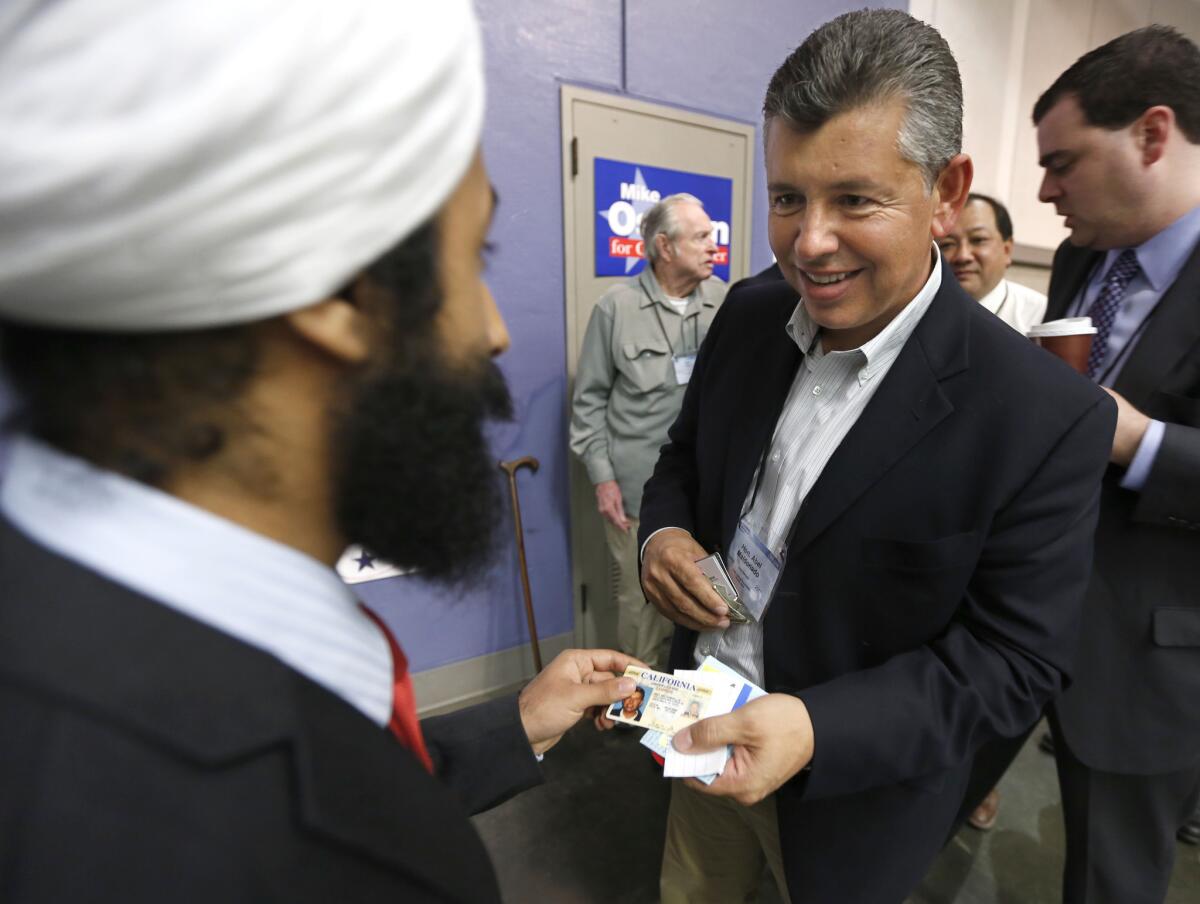The GOP’s Latino problem

- Share via
Abel Maldonado, the Republican iconoclast most recently famous for his brief stint as California’s appointed lieutenant governor and his unsuccessful run for Congress last year, is making noises about running for governor in 2014 against Jerry Brown.
Will putting up a Latino face for the state’s top office reverse more than two decades of rejection for the GOP by the fast-growing Latino community? Can even a Latino Republican win Latino votes in California? Both history and the data tell us not to bet on it.
I know and like Maldonado, the son of a migrant farmworker, and consider him a smart, decent, charming fellow. But the scarlet “R” that brands the GOP in California is arguably too toxic to elect even a moderate Latino Republican to statewide office, let alone draw significant Latino votes in the process.
First, a history lesson. In three of the last four non-presidential elections, Republicans actually nominated Latinos for statewide office: Ruben Barrales for controller in 1998, Gary Mendoza for insurance commissioner in 2002 and Maldonado for lieutenant governor in 2010. All three were attractive, articulate candidates with compelling personal stories.
But all three went down in flames, receiving an average of only 37.9% of the vote. And there is no indication in postelection analyses that they received any meaningfully higher share of the Latino vote than a white male GOP candidate would have gotten.
In fact, the last Republican Latino statewide officeholder was elected 142 years ago, when Romualdo Pacheco won the lieutenant governorship in 1871, then served several months as governor in 1875.
In next-door Nevada, a Latino Republican, Brian Sandoval, was elected governor in 2010. But Sandoval, a former federal judge, won with only 33% of the Latino vote; 64% of Latinos voted for his white Democratic opponent. As Arturo Vargas, executive director of the National Assn. of Latino Elected and Appointed Officials, told the New York Times about Maldonado’s defeat that year, “Latinos don’t vote by surname only.”
In 2006, the California GOP put up its typical lily-white ticket consisting of seven middle-aged males running for state constitutional office — and, just to make sure they didn’t alienate their white-male base, yet another one against Sen. Dianne Feinstein. All but two — Gov. Arnold Schwarzenegger and Steve Poizner, running for insurance commissioner — went down to defeat.
In 2010, the party tried something different, fielding its most diverse ticket in history. It consisted of the first-ever Republican female nominees for both governor and U.S. Senate, a Latino for lieutenant governor (Maldonado), an African American for secretary of state and another woman for treasurer.
In the end, however, it didn’t matter. Every one got mowed down and the Democrats carried all statewide constitutional offices for the second time in the last three election cycles (they also did it in 2002, for the first time since 1882).
Now for some data. Part of the GOP problem with Latinos is generational. Latinos are, on average, the youngest-skewing voters of all, and Republicans are in deep trouble with young voters of all ethnicities. Data indicate that more than 70% of all Latino voters in the Golden State have registered since 1994, when the divisive, anti-immigrant Proposition 187 campaign was spearheaded by Republican Gov. Pete Wilson. Proposition 187 was a watershed event in California political history, as it turned an entire generation of Latinos into reliable Democratic voters.
How reliable? Some voter blocs in California tend to be swing voters; not Latinos. A huge majority of California Latinos vote generically Democratic, whether the Democratic candidate is strong or weak, pretty or ugly, wins or loses.
Perhaps the most telling case study about the Republicans’ dire predicament with Latinos is provided by the 2008 presidential race. On California’s Democratic presidential primary ticket that year, Hillary Rodham Clinton won the Latino vote over Barack Obama by a huge margin, 67% to 32%. This led to GOP conjecture that Latinos might be reluctant to vote for a black man in the fall, and thus might be more open to the Republican nominee. A May Field poll showed Latinos still favoring Clinton over Obama, 63% to 29%.
But by July, another Field poll showed Obama, who was by then the presumptive nominee, with a 64% to 21% lead among Latinos over Republican John McCain. And in November, Obama beat McCain among California Latinos, 74% to 23%. So much for that opening. Nationally, as well as in California, no other major demographic voting group swung so heavily from Clinton to Obama between the primary and the general election as did Latinos.
In further bad news for the California GOP, Latinos also are the fastest-growing segment of the electorate. Whites have been declining in terms of the composition of the turnout for years. In 1994, with Wilson seeking a second term and Proposition 187 on the ballot, whites constituted 82% of the state’s voters, Latinos only 8%. In the 2012 general election, whites were just 55%, while Latinos were 22%, a historic high. And since 1994, GOP nominees for president and governor in the state have received only, on average, 25.5% of the Latino vote. As Bill Clinton would say, do the math.
Latino voters, by any analysis — historical or statistical — are just not available for Republican candidates in California at this time, whether Latino-surnamed or not.
So, buena suerte, Abel, but my friendly advice: Keep your day job.
Garry South is a longtime Democratic strategist and commentator who ran Gov. Gray Davis’ campaigns in 1998 and 2002.
Garry South is a longtime Democratic strategist and commentator who ran Gov. Gray Davis’ campaigns in 1998 and 2002.
More to Read
A cure for the common opinion
Get thought-provoking perspectives with our weekly newsletter.
You may occasionally receive promotional content from the Los Angeles Times.










